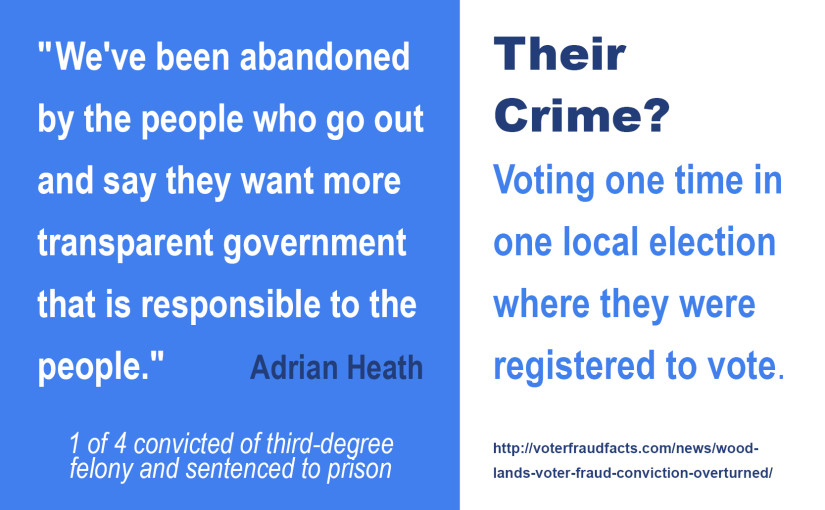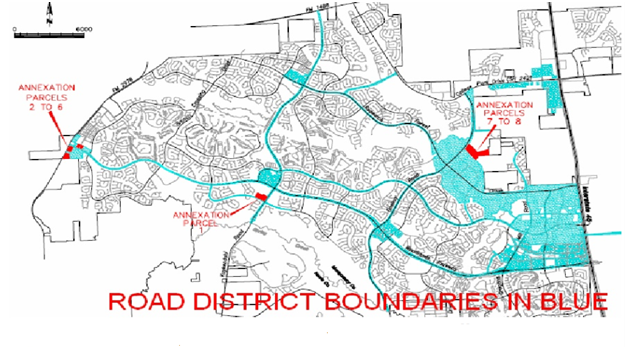James Alan Jenkins’s voter fraud conviction was overturned by the Texas 14th Court of Appeals due to the Jury not being instructed in mistake of law.
The Judge in the first trial refused to instruct the Jury that Jenkins had sought counsel from state officials in Texas and reasonably believed his actions were legal, including a key recorded phone call from a state official. The Judge also refused to instruct the Jury about the mistake of law defense. Three others were also convicted for voter fraud relating to this case and they are also appealing their convictions. This decision gives hope that the others will also be granted retrials.
The Facts About The Woodlands Voter Fraud Case
This may be by far the most confusing voter fraud case ever encountered. It involves a utilities district with very few registered voters because there are no residential zones in this district, the district has representatives that ran unopposed for 8 years, and when their positions are challenged arrests are made. Sounds a bit shady, so lets take a closer look.
The Woodlands, TX

The Woodlands Road Utility District #1 (aka RUD)
- The Woodlands RUD #1 was created in 1991 and given the responsibility to maintain the roads within the district and the authority to pass bonds to do so.
- The commercial and industrial properties in The Woodlands RUD #1 are taxed 36 cents per $100 property value.
- The Woodlands RUD #1 has $110 million in debt when you combine principle and interest.
- Five representatives were appointed and confirmed to a board of directors for The Woodlands RUD #1 in an initial “election” in 1992 preformed in one of the few residential homes in the district, which have since been torn down for commercial use.
- These representatives were uncontested until 2010 when Jenkins 3 friends completed applications to get their names on the ballot.
- In fact, The Woodland’s RUD #1 had skipped 15 election cycles because they believed that there were no registered voters in the district.
- There are no residential zones within The Woodlands RUD #1 and only one couple has been given special permission to construct a residence next to a commercial building they own in The Woodlands RUD #1. This information only surfaced because Jenkins and his friends were pushing for an election to be held.
- At this time, according to the Board of Directors, there are only 4 registered voters in The Woodlands RUD #1 and each is registered at a commercial property.
- In 2015 (after Jenkins’s conviction), the board for The Woodlands RUD #1 was expanded from 5 to 7 directors “to broaden the representation (of the RUD).” Who, exactly, they are representing is unclear.
- Once again these “representatives” were appointed by The Woodlands city Commissioners and will presumably run unopposed for the foreseeable future.
How Did Jenkins Become Involved with The Woodlands RUD #1?
Jenkins involvement began because of Adrian Heath, a friend and fellow resident in the city of The Woodlands, Texas. From 2008 to 2009 Heath discovered The Woodlands RUD #1 while researching local government debt. Like most residents of The Woodlands, Texas, he frequented the roads and businesses within The Woodlands RUD #1 often and he felt that the decisions made by it’s representatives, and their indebtedness, effected all the residents of the city.
Heath was concerned about the fact that the representatives on the board are not held accountable to the residents of the city and “Heath believed that the RUD’s board acted primarily to benefit The Woodlands Development Company.”
He did extensive research and had correspondence with local and state officials, including email correspondence with attorney Mike Page who deals with “public finance and local government law, including representation of municipal utility districts“. He discovered that three of the five positions for The Woodlands RUD #1 representatives were set to expire in 2010, and thus were up for election. This spurred more researched into legal avenues for being elected to these positions and the process of attaining residency in The Woodland’s RUD #1 for the purpose of voting.
In 2009, he gathered together a group of his friends, including Jenkins, and gave a presentation to raise awareness about The Woodlands RUD #1, their indebtedness, and to encourage his friends to run for positions on the board. The ultimate goal being to be elected and to use the positions to dissolve the district altogether.
Richard McDuffee, Peter J. Goeddertz, and Bill Berntsen Challenge the Incumbent Board Directors in 2010
- McDuffee, Goeddertz, and Berntsen are all Republicans, politically active, and long-time residents of the city of The Woodlands, Texas.
- All three complete applications to be on the ballot for the positions.
- All three, along with Heath, Jenkins, and five other supporters changed their voter registration address to 9333 Six Pines Drive, the address of a Marriott Residence Inn located within The Woodlands RUD #1 boundaries.
- A document from the Voter Registrar for the County of Montgomery dates April 19th, 2010 lists them and states the office “certify that this list of registered voters is comprised of the Official State List of Registered Voters…”
- On April 21, 2010 Jenkins, and most of the others, were sent letters from the DA Phil Grant encouraging them to seek counsel and look into laws regarding their voter eligibility or residency. They already had done so, but did so again.
- The letter also referenced The Attorney General Opinion Number GA-0141 which states “the intention of the voter registration applicant is crucial to a proper determination of residence and every person is strongly presumed to have “the right and privilege of fixing his residence according to his own desires.””
- Jenkins, McDuffee, Goeddertz, Berntsen, Heath and the five other supporters made reservations and checked-in at the Marriott Residence Inn the day before the election.
- All of them voted.
- Early voting totals on election day, May 8th 2010, showed two votes for the incumbents. Presumably from the couple mentioned earlier who are the only landowners who had special permission to build a residence next to their commercial building within the RUD.
- The incumbents lost the election 10-2 with all 10 votes for McDuffee, Goeddertz, and Berntsen placed by themselves, Jenkins, Heath and their supporters.
- A few days after the election the incumbents filed a lawsuit to challenge the election results based on voter fraud.
- As a result, many of those involved booked additional stays at Marriott Residence Inn and Jenkins even changed his driver’s license address and placed his home for sale.
- Election results were eventually tossed by a Judge and the incumbents regained their seats.
- Jenkins was indicted for third-degree felony of illegal voting on March 8th, 2012. He was convicted and sentenced to 3 years in prison.
- In addition, Adrian Heath, and two other supporters who refused to plead guilty in exchange for probation have also been convicted of illegal voting and sentenced to prison.
- All four convictions are being challenged.
- The other six individuals involved eventually plead guilty in exchange for probation, all except one continued to assert that they believed what they were doing was legal when they gave testimony at their friends trials.
- The one whose testimony acknowledge personal guilt did so only because he was the only one who did not physically stay over night at the hotel. He stated that he believed that physical presence was required for claiming residence at the hotel.
The Mistake of Law Defense
In June of 2013, Jenkins was convicted of voter fraud and sentenced to 3 years in prison for voting in a 2010 election for The Woodlands Road Utility District #1 (RUD). In June of 2015, this conviction was overturned because the Jury was not counseled that they had the option to find Jenkins not guilty based on mistake of law. They were also denied testimony that Jenkins sought counsel from Texas state officials prior to changing their voter registration address.
A mistake of law defense generally argues that a person is not guilty of violating law because he/she did not understand how the law applied to them. It typically requires that the defendant made an effort to understand the law and how it applied to them, but there have been cases in which it was used as a defense because a law had changed just prior to the offense.
- There is significant documentation and even phone recordings available demonstrating that it was reasonable for Jenkins and Heath to believe their actions taken to gain voter registration in the RUD was legal.
- When this recording was made public, Joe Kulhavy was fired and this testimony was not allowed at the criminal trials. Joe Kulhavy has since gone back to being a private attorney and began an election-law blog.
- In fact, there is no Texas law specifically requiring someone physically live in a district they are registered to vote in, only that they have an address to use for residency in that district. This is actually the case in most states. For example, a person can be planning to move to a new location and preemptively register to vote in that location, so long as they have an address in that location to use for residency.
- There is also no law stating a voter can’t use the intention of voting in a particular election as grounds for changing their residency.
- In this case, the mistake of law defense is applicable because Jenkins and Heath made a significant effort to understand the law including: researching voter registration and boundary maps for the RUD, correspondence with Texas state and local government officials to discuss the legalities and court cases regarding establishing residency for the purpose of voter registration.
Editorial Conclusion
Understanding the key issues about this case leaves more questions than answers. How was Jenkins even indicted if there is no law calling his actions illegal? Who exactly are these Board of Directors “representing”? Is there any way for citizens of The Woodlands to participate in the elections for these director’s positions when there are no residential zones within the district? Why are these people being treated like violent criminals for attempting to legally participate in an election process which has an affect on them and their community?
It appears that Jenkins and his friends found a legal loophole to participate in an election which, for 8 years, went uncontested because of legal loopholes. A loophole that has been repeatedly exploited by developers in Montgomery County who hire “Rent-a-Voter” services to move voters into areas with no voters for the purpose of voting on Bonds to pay the developers. Despite this, Jenkins and three others were convicted of third-degree felony charges for illegal voting and sentenced to prison. It also appears that The Woodlands RUD #1 boundaries were placed specifically to keep voters from participating in the election process and that the “elected” representatives of the district used the legal system to commit election fraud in order to maintain their positions of power.
Other shady facts about this case include: a law firm that has represented both the incumbents and also The Woodlands Development Company (the primary company receiving money from the RUD bonds), campaign contributions for political officials intent on prosecuting Jenkins and his friends which came from both The Woodlands Development Company and the law firm. Additionally, a sworn affidavit from Jim Doyle who spoke with Tommy Williams about the case where Williams acknowledge that he would “influence Attorney General Greg Abbot to prosecute [them]” was not allowed as evidence in these individuals cases.
Luckily for Jenkins, the Judge overturned the conviction and sent the case for retrial. Unfortunately, Jenkins’s fate still hangs in the balance and The Woodlands RUD #1 continues to create more local government debt to pay the contractors of their choosing unchallenged and without constituents to hold them accountable.

